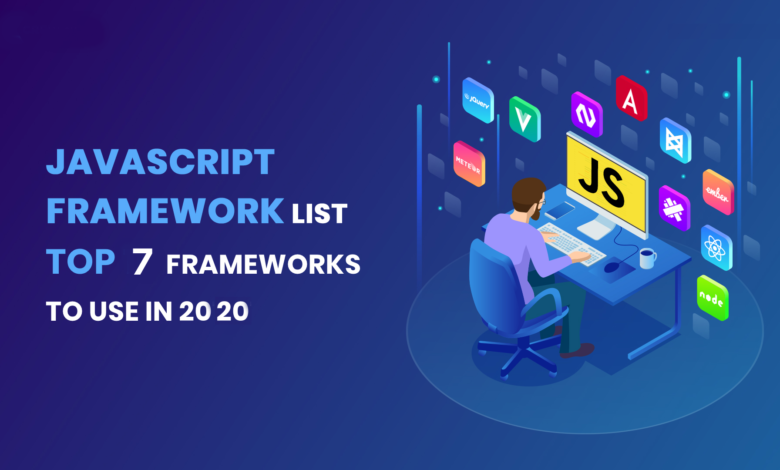
Being one of the best scripting languages for creating attractive and functional interfaces, JavaScript has become the most popular choice among web app developers due to its vigorous features and functions. JavaScript is used to build server-side, client-side, desktop, and mobile apps.
But, one thing that most developers often get confused with while using JavaScript is selecting the Right JavaScript Framework. And choosing the right framework that provides all the essential functionalities is very crucial for using JavaScript. So, today we will talk about selecting the best JavaScript framework to use JavaScript for your web app.
Read more: Computerized Marketing: A basic diagram for fledglings!
What is JavaScript Framework?
A JavaScript framework is basically an application framework that is scripted in JavaScript, it discriminates itself from the JavaScript library in various forms. What makes JavaScript framework popular amongst developers is that the developers don’t need to call the code, the framework itself calls the code. This way developers can develop their web app quickly with reduced complexity.
JS Framework provides instant feedback to the developers related to the app development so that they can dynamically exchange data between a server and website. Since its inception, there has been a lot of improvement in the JavaScript frameworks with continuous updates.
Also, the broad developer community of JavaScript developers that offers continuous support and security, patterns for faster completion of JavaScript projects, and pre-built functions have made JavaScript frameworks more popular amongst developers.
So, what are the right JavaScript Framework that you should look for in 2020?
After in-depth research, our team of experienced developers created this list of right JavaScript Frameworks to be used in 2020.
Read more: Top 10 Online Learning Apps for Students
1. Angular JS
The reason we are putting Angular JS at number one is that it is an all-in-one framework that gives you the ability to create accessible applications with multiple features. It is an open-source framework that is used for creating dynamic web applications. Angular JS is based on client-side technology, which makes it capable of bringing functionalities like HTML, CSS, and JavaScript together. With these functionalities, developers can build their templates based on HTML and extend the HTML syntaxes according to their needs.
Based on TypeScript, Angular JS doesn’t require much coding, which makes it the perfect choice for building apps that require an interactive client-side development. Moreover, it is included with data-binding that helps in improving the testing process while simplifying the development process.
Features –
- It supports TypeScript version 2.4
- Detect errors in code as soon as you type
- Simplifies the development of progressive web applications
- Included with new features of string-based enums
- Remove unnecessary code with the help of build optimizer function
But, it requires immersive expertise to use AngularJS in an efficient way.
Read more: 5 Best Free Blogging Platforms to Start Your Blog
2. ReactJS
ReactJS is another JavaScript library that is maintained by Facebook. It is also an open-source JS library that can be used to build user interfaces for cross-platform apps and responsive single-page applications. What makes ReactJS more interesting is that you can handle the new layers for your web and mobile apps.
ReactJS compromises of Virtual DOM that allow developers to develop a dynamic UI quickly with less complexity. Also, it comes with the reloading functionality that makes it easier for developers to see the code changes in real-time. ReactJS is widely recommended to build enterprise applications that require powerful and high performance.
Features –
- Build standalone applications for both iOS and Android with one configuration file
- Provide quick publishing of app updates
- Create new builds for Android and iOS with Expo in just one click
- Uses JavaScript extension JSX to keep syntaxes shorter and simple
- Easily pair-up with PHP framework of Laravel Development for app development
But ReactJS comes with an extensive list of choices, which makes it complicated to use in the beginning.
3. js
Vue.js was introduced by Evan You in 2013, which is widely popular in mobile app development. In fact, it is the only framework that is giving a huge competition to ReactJS and Angular JS framework. Vue.js uses the most common web technologies to build apps according to user needs. It can easily integrate with other JavaScript libraries and capable of reusing existing projects. Vue comes with a simple syntax and coding style that is almost similar to Angular.
If you are building an app that demands constant and real-time updates, then Vue.js is the right JavaScript framework. It uses single file components and plain HTML-based templates that make it the best solution for developing interactive web interfaces and user interfaces.
Features –
- An open-source framework that comes with an adaptable architecture
- Easy to download and install as the file size of the framework is 18-21 kb
- Write application code with ease with comprehensive documentation
- Provide better TypeScript integration
- Easy integration with different programming languages
The developer community of Vue.js is primarily based in Asia, which makes it hard for other country’s developers to get proper support.
4. NodeJS
NodeJS is one of the best cross-platform app development frameworks; it is a JavaScript runtime environment focused on server-side development. This open-source framework can also be used to develop APIs and backend services. One thing that you should know about NodeJS is that it is not built on JavaScript; it is made with C++ and C programming languages.
As compared to other frameworks, NodeJS is easy to learn and can be run as a single programming language for both front-end and back-end development. It comes with a non-blocking I/O system, which allows it to handle simultaneous requests.
Features –
- Facility to create network applications with concurrent architecture
- Easy installation and execution
- Provide high performance of HTTP and TCP protocols
- Helps in reducing page loading time
NodeJS comes with all the functionalities that are required by JavaScript developers, but there are certain performance and design issues, which make it less popular amongst developers.
5. Meteor JS
Meteor JS is an open-source full-stack JavaScript framework, which is developed using Node.js environment. It was initially launched as Skybreak, which was designed to build feature-full applications. It provides an extensive range of JavaScript libraries and packages.
Meteor JS uses the MVC pattern, which provides faster development for web and mobile apps. In short, it offers an end-to-end solution for app development, included with all the tools that are required for front-end and back-end development. Moreover, you can integrate Meteor JS with MongoDB database effortlessly while engaging the distributed data protocol to transfer data changes to clients automatically without captivating developers to write any synchronization code.
Features –
- Provide responsive design to your web apps so that they can run smoothly on both desktop and mobiles
- Get real-time updates as changes are updated instantly
- Push your app to deployment with a single command
The only drawback with Meteor JS is that the rendering at the server end is a little low.
6. Ember JS
This is another excellent JavaScript framework that is trending in 2020 and will continue to trend in 2020. Ember JS is an open-source framework that is based on a Model-view-view-Model pattern; it is used to build single-page web applications and mobile applications. Ember JS is widely popular amongst Apple developers for iOS applications. One example of an Ember-based mobile app is Apple Music.
If you are planning to develop a complete development stack, a single page app, or a large web app in JavaScript, then Ember is the right JavaScript framework. Its backward compatibility with different versions and the handlebars layout makes it easier for developers to write advanced HTML tags that are accurate for application.
Features –
- Comes with a well-defined structure and make it easy to use
- Supports data-binding with the MVC structure
- Allow developers to use future JavaScript and transpire them
- Comes with multiple functionalities like exclusive debugging facilities, higher consistency, and full-stack development
The size of the Ember framework is a bit large, which can become an obstacle for individual developers.
7. Polymer
Launched by Google in 2013, Polymer is an open-source JavaScript library that can be used to develop web apps by making use of customized HTML elements. Polymer framework is designed in such a way that developers can use specifications of new web elements to create custom elements.
Also, it is compatible with both a one-way and two-way data binding process and enables developers to create elements for the web app without getting into complex coding and development. There are many popular web apps that are designed using the Polymer framework, such as YouTube, Netflix, and Google Play Music.
Features –
- Allow developers to break their app into modules so that they can write code more clearly
- First of its kind in JavaScript library that uses component composition to support the development of interactive applications
- Comes with multiple components and structure design process
You can also use Spring Boot REST resources with the Polymer framework that will make it easy for you to develop your web app.
These are some of the right JavaScript frameworks that are trending in 2020 and will continue to rule in 2020. Depending on the features, you can choose the framework that best fits your needs. Moreover, after developing your web app, you might need to test it for various purposes like functionality, speed, user interface, or browser compatibility. In that case, you can leverage the power of LambdaTest that supports almost every JavaScript framework to test various components of a web app.
Conclusion
JavaScript has become highly popular amongst developers because it can be utilized to develop both front-end and back-end of a web app. But, using implementing JavaScript in a web app requires a reliable and scalable framework, which is often complicated for developers to choose. In this article, we mentioned the right javascript frameworks that will continue to rule in 2020 and can be used by developers for web app development.












One Comment